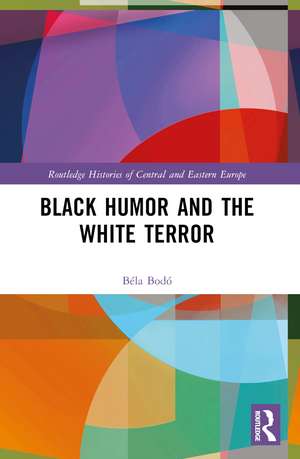Black Humor and the White Terror: Routledge Histories of Central and Eastern Europe
Autor Béla Bodóen Limba Engleză Paperback – 26 aug 2024
On the other hand, this study follows a historical and political approach to the same topic and focuses on the reaction of urban, middle-class, and culturally assimilated Jews to recent events: to the disintegration of the Dual Monarchy, the collapse of law and order, increased violence, the reversal of Jewish emancipation and the rise of new and more pernicious antisemitic prejudices. The study sees humor not only as a form of entertainment and jokes as literature and a product of popular culture, but also as a heuristic device to understand the world and make sense of recent changes, as well as a means to defend one’s social position, individual and group identity, strike back at the enemy, and last but not least, to gain the support and change the hearts and minds of non-Jews and neutral bystanders.
Unlike previous scholarly works on Jewish resistance during the Holocaust, this study sees Budapest Jewish humor after WWI as a joint adventure: as a product of urban and Hungarian culture, in which Jewish not only played an important role but also cofounded. Finally, the book addressed the issue of continuity in Hungarian history, the "twisted road to Auschwitz": whether urban Jewish humor, as a form of escapism, helped to desensitize the future victims of the Holocaust to the approaching danger, or it continued to play the same defensive and positive role in the interwar period, as it had done in the immediate aftermath of the Great War.
| Toate formatele și edițiile | Preț | Express |
|---|---|---|
| Paperback (1) | 310.84 lei 3-5 săpt. | +20.59 lei 4-10 zile |
| Taylor & Francis – 26 aug 2024 | 310.84 lei 3-5 săpt. | +20.59 lei 4-10 zile |
| Hardback (1) | 895.63 lei 6-8 săpt. | |
| Taylor & Francis – 6 apr 2023 | 895.63 lei 6-8 săpt. |
Din seria Routledge Histories of Central and Eastern Europe
-
 Preț: 311.41 lei
Preț: 311.41 lei -
 Preț: 311.90 lei
Preț: 311.90 lei - 8%
 Preț: 382.96 lei
Preț: 382.96 lei -
 Preț: 310.55 lei
Preț: 310.55 lei - 9%
 Preț: 868.47 lei
Preț: 868.47 lei -
 Preț: 311.48 lei
Preț: 311.48 lei -
 Preț: 310.22 lei
Preț: 310.22 lei -
 Preț: 310.84 lei
Preț: 310.84 lei -
 Preț: 310.99 lei
Preț: 310.99 lei -
 Preț: 389.66 lei
Preț: 389.66 lei -
 Preț: 310.22 lei
Preț: 310.22 lei -
 Preț: 163.04 lei
Preț: 163.04 lei - 18%
 Preț: 1000.27 lei
Preț: 1000.27 lei -
 Preț: 309.79 lei
Preț: 309.79 lei - 18%
 Preț: 1000.27 lei
Preț: 1000.27 lei - 16%
 Preț: 264.98 lei
Preț: 264.98 lei - 18%
 Preț: 1006.77 lei
Preț: 1006.77 lei -
 Preț: 385.47 lei
Preț: 385.47 lei - 18%
 Preț: 1001.39 lei
Preț: 1001.39 lei - 18%
 Preț: 1000.27 lei
Preț: 1000.27 lei - 18%
 Preț: 887.43 lei
Preț: 887.43 lei -
 Preț: 387.49 lei
Preț: 387.49 lei - 18%
 Preț: 1002.02 lei
Preț: 1002.02 lei -
 Preț: 389.66 lei
Preț: 389.66 lei - 18%
 Preț: 1006.43 lei
Preț: 1006.43 lei - 18%
 Preț: 1109.18 lei
Preț: 1109.18 lei - 19%
 Preț: 269.84 lei
Preț: 269.84 lei -
 Preț: 311.41 lei
Preț: 311.41 lei - 18%
 Preț: 1003.30 lei
Preț: 1003.30 lei - 18%
 Preț: 1000.27 lei
Preț: 1000.27 lei - 18%
 Preț: 1006.77 lei
Preț: 1006.77 lei - 17%
 Preț: 259.72 lei
Preț: 259.72 lei -
 Preț: 390.84 lei
Preț: 390.84 lei
Preț: 310.84 lei
Nou
Puncte Express: 466
Preț estimativ în valută:
59.49€ • 61.88$ • 49.11£
59.49€ • 61.88$ • 49.11£
Carte disponibilă
Livrare economică 25 martie-08 aprilie
Livrare express 08-14 martie pentru 30.58 lei
Preluare comenzi: 021 569.72.76
Specificații
ISBN-13: 9781032124032
ISBN-10: 1032124032
Pagini: 282
Ilustrații: 62
Dimensiuni: 156 x 234 x 18 mm
Greutate: 0.4 kg
Ediția:1
Editura: Taylor & Francis
Colecția Routledge
Seria Routledge Histories of Central and Eastern Europe
Locul publicării:Oxford, United Kingdom
ISBN-10: 1032124032
Pagini: 282
Ilustrații: 62
Dimensiuni: 156 x 234 x 18 mm
Greutate: 0.4 kg
Ediția:1
Editura: Taylor & Francis
Colecția Routledge
Seria Routledge Histories of Central and Eastern Europe
Locul publicării:Oxford, United Kingdom
Public țintă
Academic and PostgraduateCuprins
War-Time Humor / Jewish Black Humor / Anti-Defamation Humor / Nobles and Peasants / Humor as an Outlet for Internal Tensions / Epilogue
Notă biografică
Béla Bodó is a Professor of Eastern European History at the University of Bonn, Germany. He is the author of The White Terror: Antisemitic and Political Violence in Hungary, 1919–1921 (Routledge, 2019) and Tiszazug: Social History of a Murder Epidemic (Columbia University Press, 2002).
Descriere
This book examines political humour as a reaction to the lost war, the post-war chaos and antisemitic violence in Hungary between 1918 and 1922.
